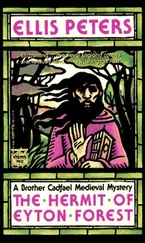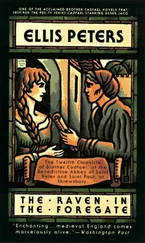Ellis Peters - The Devil's Novice
Здесь есть возможность читать онлайн «Ellis Peters - The Devil's Novice» весь текст электронной книги совершенно бесплатно (целиком полную версию без сокращений). В некоторых случаях можно слушать аудио, скачать через торрент в формате fb2 и присутствует краткое содержание. Жанр: Старинная литература, на английском языке. Описание произведения, (предисловие) а так же отзывы посетителей доступны на портале библиотеки ЛибКат.
- Название:The Devil's Novice
- Автор:
- Жанр:
- Год:неизвестен
- ISBN:нет данных
- Рейтинг книги:3 / 5. Голосов: 1
-
Избранное:Добавить в избранное
- Отзывы:
-
Ваша оценка:
- 60
- 1
- 2
- 3
- 4
- 5
The Devil's Novice: краткое содержание, описание и аннотация
Предлагаем к чтению аннотацию, описание, краткое содержание или предисловие (зависит от того, что написал сам автор книги «The Devil's Novice»). Если вы не нашли необходимую информацию о книге — напишите в комментариях, мы постараемся отыскать её.
The Devil's Novice — читать онлайн бесплатно полную книгу (весь текст) целиком
Ниже представлен текст книги, разбитый по страницам. Система сохранения места последней прочитанной страницы, позволяет с удобством читать онлайн бесплатно книгу «The Devil's Novice», без необходимости каждый раз заново искать на чём Вы остановились. Поставьте закладку, и сможете в любой момент перейти на страницу, на которой закончили чтение.
Интервал:
Закладка:
“How long,” asked Hugh, “to make this much new growth, and at this season?”
Cadfael pondered, digging a toe into the soft mat of old growth below. “A matter of eight to ten weeks, perhaps. Difficult to tell. And the blown ash might show as long as that. Mark was right, the heat reached the trees. If this floor had been less bare and hard, the fire might have reached them, too, but there was no thick layer of roots and leaf-mould to carry it along the ground.”
They returned to where the covering of earth and leaves now lay drawn aside, and the ridged surfaces of logs showed, blackened but keeping their shape. The sergeant and his men laid down their tools and went to work with their hands, hoisting the logs off one by one and stacking them aside out of the way. Slow work; and throughout Meriet stood watching, motionless and mute. The dead man emerged from his coffin of timber piecemeal after more than two hours of work. He had lain close to the central chimney on the leeward side, and the fire had been fierce enough to burn away all but a few tindery flakes of his clothing, but had passed by too rapidly to take all the flesh from his bones, or even the hair from his head. Laboriously they brushed away debris of charcoal and ash and half-consumed wood from him, but could not keep him intact. The collapse of part of the stack had started his joints and broken him apart. They had to gather up his bones as best they could, and lay them out on the grass until they had, if not the whole man, all but such small bones of finger and wrist as would have to be sifted from the ashes. The skull still retained, above the blackened ruin of a face, the dome of a naked crown fringed with a few wisps and locks of brown hair, cropped short.
But there were other things to lay beside him. Metal is very durable. The silver buckles on his shoes, blackened as they were, kept the form a good workman had given them. There was the twisted half of a tooled leather belt, with another silver buckle, large and elaborate, and traces of silver ornamenting in the leather. There was a broken length of tarnished silver chain attached to a silver cross studded with what must surely be semi-precious stones, though now they were blackened and encrusted with dirt. And one of the men, running fine ash from close to the body through the sieve, came to lay down for examination a finger-bone and the ring it had loosely retained while the flesh was burned from between. The ring bore a large black stone engraved with a design fouled by clotted ash, but which seemed to be a decorative cross. There was also something which had lain within the shattered rib-cage, burned almost clean by the fire, the head of the arrow that had killed him.
Hugh stood over the remnants of a man and his death for a long while, staring down with a grim face. Then he turned to where Meriet stood, rigid and still at the rim of the decline.
“Come down here, come and see if you cannot help us further. We need a name for this murdered man. Come and see if by chance you know him.”
Meriet came, ivory-faced, drew close as he was ordered, and looked at what lay displayed. Cadfael held off, but at no great distance, and watched and listened. Hugh had not only his work to do, but his own wrung senses to avenge, and if there was some resultant savagery in his handling of Meriet, at least it was not purposeless. For now there was very little doubt of the identity of this dead man they had before them, and the chain that drew Meriet to him was contracting.
“You observe,” said Hugh, quite gently and coldly, “that he wore the tonsure, that his own hair was brown, and his height, by the look of his bones, a tall man’s. What age would you say, Cadfael?”
“He’s straight, and without any of the deformities of ageing. A young man. Thirty he might be, I doubt more.”
“And a priest,” pursued Hugh mercilessly.
“By the ring, the cross and the tonsure, yes, a priest.”
“You perceive our reasoning, Brother Meriet. Have you knowledge of such a man lost hereabouts?”
Meriet continued to stare down at the silent relics that had been a man. His eyes were huge in a face blanched to the palest ivory. He said in a level voice: “I see your reasoning. I do not know the man. How can anyone know him?”
“Not by his visage, certainly. But by his accoutrements, perhaps? The cross, the ring, even the buckles—these could be remembered, if a priest of such years, and so adorned, came into your acquaintance? As a guest, say, in your house?”
Meriet lifted his eyes with a brief and restrained flash of green, and said: “I understand you. There was a priest who came and stayed the night over in my father’s house, some weeks ago, before I came into the cloister. But that one travelled on the next morning, northwards, not this way. How could he be here? And how am I, or how are you, to tell the difference between one priest and another, when they are brought down to this?”
“Not by the cross? The ring? If you can say positively that this is not the man,” said Hugh insinuatingly, “you would be helping me greatly.”
“I was of no such account in my father’s house,” said Meriet with chill bitterness, “to be so close to the honoured guest. I stabled his horse—to that I have testified. To his jewellery I cannot swear.”
“There will be others who can,” said Hugh grimly. “And as to the horse, yes, I have seen in what confortable esteem you held each other. You said truly that you are good with horses. If it became advisable to convey the mount some twenty miles or more away from where the rider met his death, who could manage the business better? Ridden or led, he would not give any trouble to you.”
“I never had him in my hands but one evening and the morning after,” said Meriet, “nor saw him again until you brought him to the abbey, my lord.” And though sudden angry colour had flamed upward to his brow, his voice was ready and firm, and his temper well in hand.
“Well, let us first find a name for our dead man,” said Hugh, and turned to circle the dismembered mound once more, scanning the littered and fouled ground for any further detail that might have some bearing. He pondered what was left of the leather belt, all but the buckle end burned away, the charred remnant extending just far enough to reach a lean man’s left hip. “Whoever he was, he carried sword or dagger, here is the loop of the strap by which it hung—a dagger, too light and elegant for a sword. But no sign of the dagger itself. That should be somewhere here among the rubble.”
They raked through the debris for a further hour, but found no more of metal or clothing. When he was certain there was nothing more to be discovered, Hugh withdrew his party. They wrapped the recovered bones and the ring and cross reverently in a linen cloth and a blanket, and rode back with them to Saint Giles. There Meriet dismounted, but halted in silence to know what was the deputy-sheriff’s will with him.
“You will be remaining here at the hospice?” asked Hugh, eyeing him impartially. “Your abbot has committed you to this service?”
“Yes, my lord. Until or unless I am recalled to the abbey, I shall be here.” It was said with emphasis, not merely stating a fact, but stressing that he felt himself to have taken vows already, and not only his duty of obedience but his own will would keep him here.
“Good! So we know where to find you at need. Very well, continue your work here without hindrance, but subject to your abbot’s authority, hold yourself also at my disposal.”
“So I will, my lord. So I do,” said Meriet, and turned on his heel with a certain drear dignity, and stalked away up the incline to the gate in the wattle fence.
“And now, I suppose,” sighed Hugh, riding on towards the Foregate with Cadfael beside him, “you will be at odds with me for being rough with your fledgling. Though I give you due credit, you held your tongue very generously.”
Читать дальшеИнтервал:
Закладка:
Похожие книги на «The Devil's Novice»
Представляем Вашему вниманию похожие книги на «The Devil's Novice» списком для выбора. Мы отобрали схожую по названию и смыслу литературу в надежде предоставить читателям больше вариантов отыскать новые, интересные, ещё непрочитанные произведения.
Обсуждение, отзывы о книге «The Devil's Novice» и просто собственные мнения читателей. Оставьте ваши комментарии, напишите, что Вы думаете о произведении, его смысле или главных героях. Укажите что конкретно понравилось, а что нет, и почему Вы так считаете.












